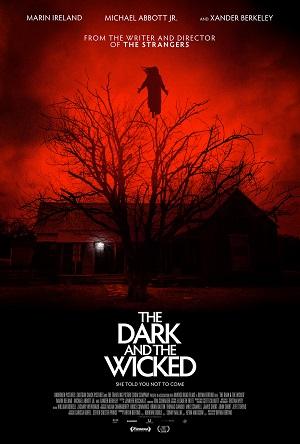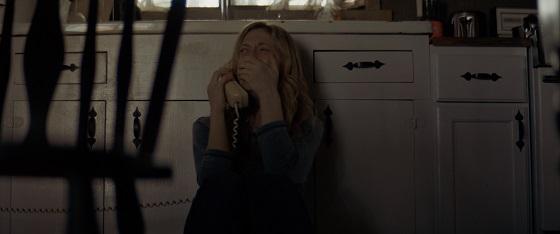

[Rating: Minor Rock Fist Up]
In Theaters, Digital, & On Demand Nov. 6.
The use of metaphor in horror pre-dates cinema, yet films have never tired of the device and likely will not any time soon. Movies have been keen to co-opt existing literary examples, like a scientist’s creation that grows beyond the control of its creator, but there have been plenty of original takes, like George A. Romero’s zombie cannon, or Ridley Scott’s 1979 masterpiece, Alien. It’s not easy work, however. One can’t just create a gestating, blood-thirsty creature that emerges from eggs and kills its host without tying it to a narrative stocked with interesting characters, exciting action set-pieces, and pitch-perfect pacing. The Dark and the Wicked is the new film by writer/director Bryan Bertino, and it has its metaphor component locked down, yet this seems to have come at the expense of character development and world building that could have taken it to the next level.
The set-up of the film is a simple one, and it helps get the story out of its blocks and moving well through its first act. Michael (Michael Abbott) and Louise (Marin Ireland) are adult siblings that have returned to their family’s Texas goat farm to help their mother (Julie Oliver-Touchstone) take care of their dying, bedridden father. Things just aren’t right at the homestead, however, and what starts as some strange, aloof behavior on their mom’s part spirals out of control into a tragedy that floors Michael and Louise.
Although a nurse comes to help take care of their dad, Michael and Louise are forced to stay the week in their childhood home to assist with their dying patriarch’s passing, which comes with a whole host of spooky baggage. Each sibling experiences strange visions that torment them yet vanish after a few head shakes and blinks, pointing towards a spirit or evil entity haunting the place. As their father slips deeper into his death spiral, Louise and Michael fight through a terrifying series of waking nightmares that they can no longer hand-waive away as a manifestation of grief or exhaustion.

The fact that Michael and Louise are struggling with the mortality of their parents, which brings with it a creeping evil that portends death and suffering, works almost too well as a thematic device. For many people, transitioning into middle age brings not just the inevitable passing of one’s mother and/or father, but a stark reminder that the grave eventually finds us all. How lonely, or in pain, or full of regret a person is near the end can only exacerbate these anxieties, and it is as real as any monster or shadow creature stalking a family on a remote farm.
The metaphor Bertino is going for is set well, here, and buttressed by a well-paced drip of dread that builds with effective urgency. How the world of Michael and Louise fits into the mechanics of the evil at work in The Dark and the Wicked is less clear, however, and never hits with the same clarity as the metaphor. It would be like if Ripley and crew encountered their xenomorph egg patch at a McDonald’s in St. Louis, or if the villagers suffered the wrath of Dr. Frankenstein’s monster with no idea how he came to be.

It’s not enough to create an effective metaphor, one has to put it into a setting with characters that can connect the scary elements to a larger, comprehensible tapestry. The evil that stalks Michael and Louise’s family is real, and not just a product of their grief, but the script never establishes where this evil came from or what it wants. It’s not enough for “grief” to be the villain, here, and while the roots of evil or calamity don’t need to be explained for a story to work (Romero’s zombies are famously without an official explanation) what is happening has to fit within a larger framework.
It’s a small quibble, really, but an important one for Bertino’s new movie, as it relies on its metaphor to carry it through to a third act that doesn’t have many answers for the questions poses in the first. The script also has a secondary character problem, like a rogue priest (Xander Berkley) that adds little to the overall story, and a ranch hand, Charlie (Tom Nowicki), who isn’t really introduced, and seems to exist as little more than fodder for the script’s shocking set-piece lust.
As an exercise in suspense and emotionally connected storytelling, it is indeed effective, needling its audience with a number of “oh shit!” moments that consistently land. Bertino and his team do fantastic work with the sound design in particular, with creaking floorboards, clanking bottles, and wind rustling through a moonlight barn all telling their own wordless stories. The script also manages to tie up its major threads by the end, giving its final few moments over to a fitting thematic resolution that rings the metaphor bell one last time, and well. There’s more good than bad in The Dark and the Wicked, and a lot of heart behind the effort. The movie is tense, unsettling, and laced with evil in all the most delightful ways, and contains a couple of genuine gasps that aren’t cheaply purchased. As a deeper meditation on grief, mortality, and the notion of legacy, the film works, even if the mechanics of its world-building and character work leave a little to be desired. It’s a fine film, dark, even: though it might just be a little thin in the middle to earn a plaudit so treasured as wicked.





Comments on this entry are closed.